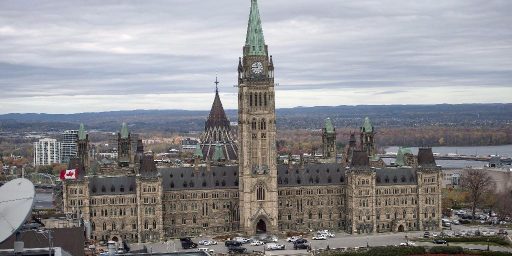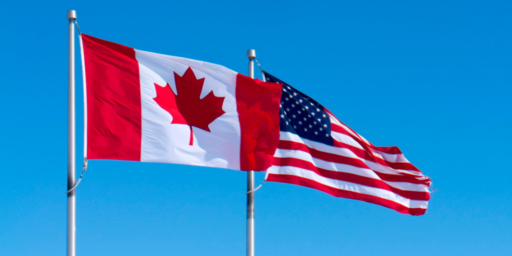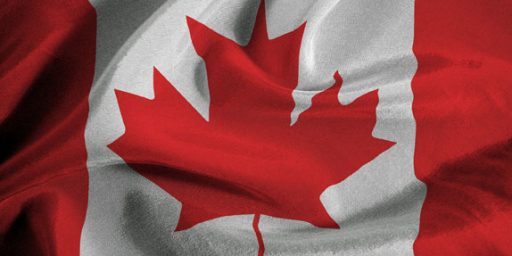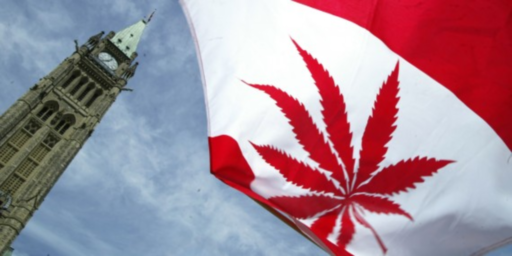Anti-Americanism May Cost Martin Election
David Sax argues that Canadian Prime Minister Paul Martin has overestimated the appeal of anti-Americanism–and it may cost him re-election.
Heading into an election campaign at the start of December, Martin’s Liberals were in deep trouble. Over the last two years, Canadians had been treated to extensive press coverage of the Liberal “sponsorship scandal,” which involved a government p.r. program in Quebec that, over the past decade, had evolved into a multimillion-dollar slush fund for the Liberal Party and its friends. Although Martin and his inner circle were cleared of any wrongdoing (most of the kickbacks were paid during the previous government), the Liberals were nonetheless tarred as the politicians who helped themselves.
To distract from the scandal, Martin chose to make anti-Americanism a hallmark of his campaign. Anti-American sentiment is common these days in Canada, which has broken with the United States over a variety of key policies, from the Kyoto Protocol to the creation of the International Criminal Court to the war in Iraq. Disputes over trade– including the softwood fight and border security–have further alienated Canadians from their southern neighbor. Martin openly chastised the Bush administration’s environmental commitment at a U.N.-sponsored climate-change conference in Montreal on December 7. The next day, Martin’s lead in the polls over his Conservative Party rival, Stephen Harper, widened to 15 points, the largest of the campaign. […]
Yet what seemed at the time to be a tailor-made scenario for a Liberal victory quickly fell flat. Since the new year, the Liberals have seen their support eaten up by the Conservatives. Fresh allegations of corruption and a new investigation into possible stock-market manipulation turned the focus back onto Liberal credibility. The cross-border rhetoric has been all but forgotten.
As The New Republic goes to press, polls show the Conservatives headed for a near-certain victory in Monday’s vote, roughly ten points ahead of the Liberals. And that means Harper, the most pro-American leader in decades, is on track to become prime minister. Martin’s failure points to the limits of anti-Americanism in Canadian politics. Differences aside, most Canadians want good relations with their neighbors. And, as prime minister, Harper will likely put an end to the darkest period in Canada-U.S. relations in recent history–to the benefit of both countries.
[…]
[W]hat the Liberals failed to realize is that, while anti-Americanism in Canada may be broad, it isn’t deep. A majority of Canadians want closer relations on issues like security, antiterrorism, and energy policy, according to a 2005 survey conducted by SES in conjunction with the University at Buffalo. However much they may dislike Bush personally, most voters realize that Canada’s relationship with the United States is vital. The Canadian economy relies on trade with the United States, which consumes 85 percent of Canadian exports and generates the bulk of Canada’s GDP. With China on track to replace Canada as America’s largest source of imports, and with developing-world agricultural producers like Brazil cutting into Canadian food sales, Canada’s economic future appears increasingly uncertain–and continued trade with the United States ever more important.
And, yet, the Liberals’ anti-American rhetoric has done serious damage to U.S.-Canadian relations. Each time a Liberal politician made a snide remark, calling Bush a “moron” or the Americans “bastards,” Washington noticed. When the Liberals backed out of Iraq and continental missile defense, the White House was openly disappointed. In return, the United States has simply closed its ears to Canadian concerns, canceling and scaling back presidential and cabinet-level visits.
For a variety of reasons, I will be quite pleased if Martin loses and the Conservatives take over. My strong sense is that, as with U.S.-German relations–and unlike U.S-French relations–the commonalities far outweigh the differences.
Canada is, in many ways, more “liberal” than the United States, especially on social-religious issues and guns. Our neighbors to the north, too, prefer a more diplomatic foreign policy. Still, we share a common ancestry and much of the same history. We’ve fought side-by-side from World War II to Vietnam to the Gulf War. Once the rhetoric dies down, so will the enmity.





Martin’s so-called “anti-americanism” is marginal to his position in the polls. The corruption scandals are what’s driving him down. That article is typical American-centrism. Not every country cares about the US and politicians’ reactions to the US with regard to domestic elections.
I agree, to some degree, with BKjfk. The America bashing tactic is the final mark of desperation when a western political party has run out of ideas, not a make or break issue. The US equivalent is the Democrats meme – “Bush is Eeeevil” or for the Republicans, the ever popular flag burning amendment. It may be a worthwhile tactic in a very close race, when you need to fire up the moron contingent of your base and get out their vote, but the more intelligent voter will see the tactic for what it is. In Martin’s case, his party’s culture of corruption has finally overwhelmed the Canadian voters patience. The “anti-americanism” is merely a sideshow.
As I type this, I’m watching Conservative Leader Stephen Harper on CBC News “Your Turn,” a Q&A program. (My cable carries CBC being near the Canadian border and I came across this cable surfing.) Five minutes of watching shows this isn’t the USA, with 5 priorities:
Reducing taxes
Accountability
Child Care
Crime
Establish standard wait times for health care
The stress I get out of his answers is that the Canadian Federal government needs to focus on doing its job properly, and not expanding into the the Provinces’ responsibilities. A good half the discussion is about corruption and accountability (including MPs swapping parties after elections). Considerable talk about being relevant to all Canadians, including French-speaking and Native Americans.
So based on what I’m watching on Canadian TV, there are other issues than anti-Americanism at the forefront of the Canadian election.
Just a slight correction. Canada and the US fought side by side since the First World War. The Canadians were in the trenches long before the first Americans arrived. Look up Vimy Ridge.
“To distract from the scandal, Martin chose to make anti-Americanism a hallmark of his campaign.”
As soon as I read that, I thought, “Canadian Bacon” (the movie) in reverse?
DCL: “Canada and the US fought side by side since the First World War.”
I was pretty sure that was the case but was too lazy to look it up, so just went the safe route.
And another correction: Canada didn’t really fight in Vietnam, although some Canadians did.
http://en.wikipedia.org/wiki/Canada_and_the_Vietnam_War
In fact, this forms another parallel between Vietnam and this Iraq war – the only two non-trivial cases where our friends up north weren’t willing to go along with us, and it turns out they might have been smarter than we were.